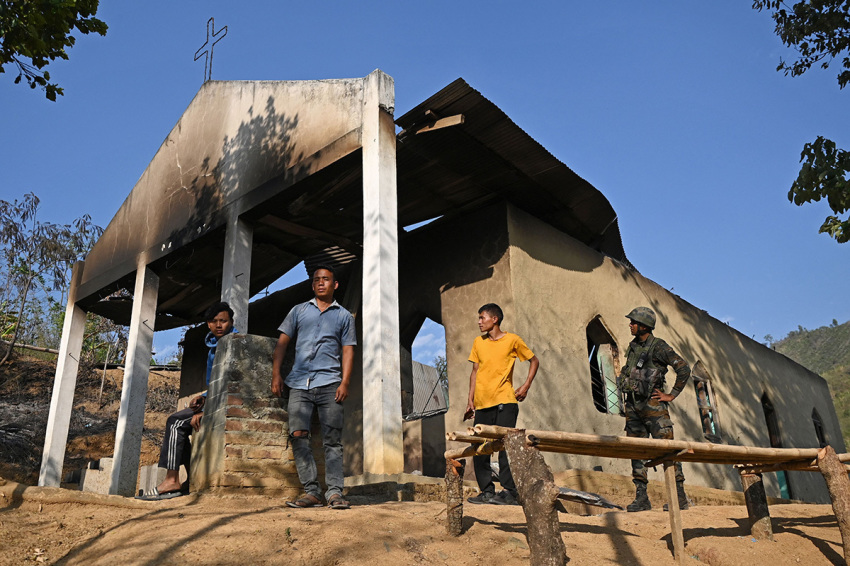Is the ongoing violence in India’s Manipur state anti-Christian?

At least 98 individuals, predominantly Christians, have died in the recent surge of violence in Manipur, a northeastern state of India. Despite the presence of certain religious undertones, local tribal leadership is not categorizing the violence as a religious conflict.
Initiated on May 3, the violence predominantly occurred in the Imphal Valley and the Churachandpur district, igniting at least four days of tumult. This turmoil was followed by near-daily firearm incidents across the state.
A local Christian leader informed The Christian Post about attacks on nine churches within the Kuki-Zomi community in Kangpokpi district that took place on Monday morning.
Churachandpur's predominantly Christian Kuki-Zomi tribal communities accuse two Meitei community organizations in Imphal, Arambai Tenggol and Meitei Leepun, of inciting this violence. The Meitei people, who account for more than 50% of the state's population, are predominantly Hindu.
According to media outlets, a sizable weapons cache exists among the rival communities.
The violence has led to the destruction or damage of thousands of homes and hundreds of churches. The death toll from ongoing violence in Manipur between the Kuki and Meitei ethnic communities reached at least 98, according to a June 2 statement from the Manipur Chief Minister's office. However, Christian Solidarity Worldwide reports that local sources are saying that over 200 people have died.
The North American Manipur Tribal Association reports that over 6,000 houses have been damaged or looted.
According to the Press Trust of India, more than 50,000 people have fled their residences, a number that increases daily. Among those displaced, about 35,000 are said to belong to Christian tribal communities.
Online videos display police indifference and alleged participation in violence against tribal individuals. Simultaneously, Meitei households in Christian tribal-dominated Churachandpur have also experienced significant damage.
An unprecedented demographic shift has occurred, with tribal inhabitants leaving the Imphal Valley. In turn, all Meiteis in Churachandpur, including government and police officials, have deserted their homes.
The conflict primarily stems from ethnic issues, but the complication for analysts arises when numerous churches belonging to Meitei Christians (about 50,000 in number) are reportedly attacked by Meitei Hindus.
The local Christian leader (who identifies as neither Meitei nor Kuki-Zomi) told CP that Meitei Christians are being pressured to renounce their Christian faith and convert to Hinduism. He shared an incident where a Hindu Meitei mob prevented a Christian family from burying a deceased member until they converted to Hinduism.
Before the violence, Christian Meitei and Kuki-Zomi communities interacted more with each other than the Hindu Meiteis had with the Kuki-Zomis. This pattern may have contributed to the attacks on Meitei churches.
Post-violence, both ethnic communities are concentrating on their respective unity, with religion being a component among others.
The Bharatiya Janata Party, a Hindu nationalist party in power at the state and federal level, is alleged to support the Meiteis.
Historically, disputes over land ownership and affirmative action policies have strained relations between the Meiteis and tribal communities. Tensions heightened after BJP's state election victory in 2017 when tribal settlements were reclassified as reserved forests, essentially treating them as illegal immigrants.
Further aggravating the situation, the highest court in Manipur instructed the government, before the violence, to consider the Meiteis' request for tribal group recognition. This instruction instigated a protest from a tribal student group, which triggered the recent eruption of violence.
The Meiteis have historically dominated the state's political and economic realms. Critics accuse Manipur's Chief Minister N. Biren Singh of ordering the demolition of churches in Imphal for alleged illegal construction, thereby worsening inter-community relations.
Following the outbreak of violence, both Singh and various Imphal-based media outlets have been referring to the Kuki-Zomis as "terrorists" or "militants."
Although a Hindu nationalist party appears to back the Meiteis, neither community is employing religious terminology.
The Kuki-Zomi leadership emphasized to CP that they don't view it as a religious conflict.
A memorandum recently submitted to India's Home Minister Amit Shah by 10 Kuki-Zomi legislators from Manipur highlights the dire situation. The legislators expressed deep-seated mistrust that the tribals harbor toward the Manipur government, necessitating a separate administrative body for Kuki-Zo-dominated districts.
Ethnic tensions have persisted in northeast India for several decades. However, they have primarily been of an ethnic nature.
As Imphal Valley and Churachandpur — once bustling areas — now resemble ghost towns, their deserted homes and streets scarred by recent violence, the federal force, Assam Rifles, and India's military seem to be providing impartial protection to both communities.
It is hoped that the state government, too, will respond judiciously and professionally. If not, the conflict could become even more complex with religion becoming an additional factor.



























